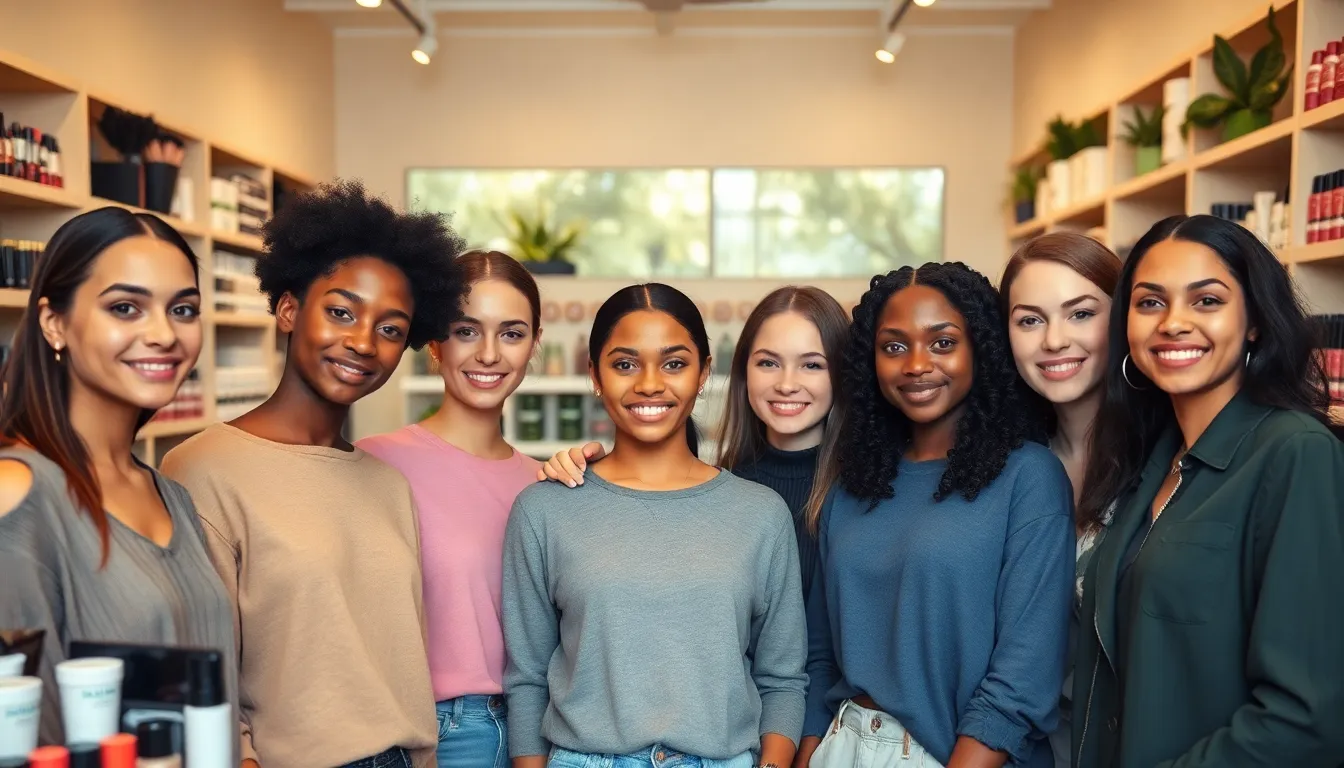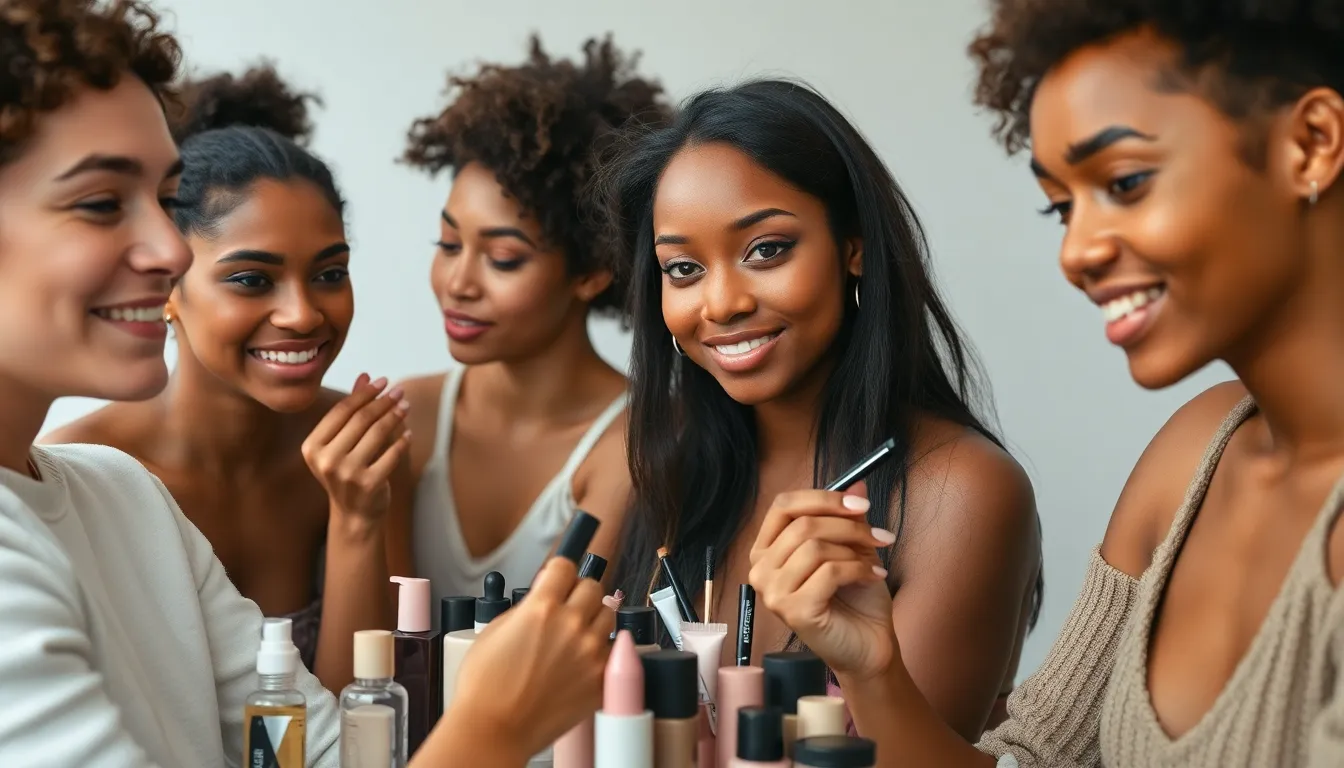Table of Contents
ToggleIn a world where individuality reigns supreme, Gen Z is redefining beauty standards and reshaping the cosmetics industry. This generation, known for its bold self-expression and commitment to authenticity, seeks products that not only enhance their appearance but also align with their values. From eco-friendly packaging to cruelty-free formulations, Gen Z consumers are driving brands to be more transparent and socially responsible.
As they navigate a landscape filled with choices, Gen Z is gravitating towards innovative cosmetics that reflect their diverse identities. They embrace makeup as a form of art and self-expression, breaking traditional norms and encouraging creativity. Understanding the unique preferences and trends of this dynamic cohort is essential for brands looking to capture their attention and loyalty in a rapidly evolving market.
Overview of Gen Z Cosmetics
Gen Z cosmetics reflect the values and preferences of a diverse generation. Emphasizing individuality, this demographic seeks products that allow for personal expression and showcase unique identities. Brands targeting Gen Z prioritize transparency in their ingredients and processes, ensuring that offerings align with sustainability and ethical standards.
Product variety caters to different skin tones and types, promoting inclusivity. Gen Z favors brands that showcase diverse representations in marketing campaigns, making authenticity crucial for brand loyalty. The popularity of social media platforms like TikTok and Instagram drives trends, with user-generated content influencing purchasing decisions.
Customization also stands out in Gen Z cosmetics. Many brands now offer products that users can personalize, aligning with the generation’s desire for tailored experiences. Unique formulations, bold colors, and innovative packaging attract attention and foster experimentation, allowing young consumers to redefine beauty on their terms.
Finally, the shift towards minimalism in makeup routines highlights a preference for multifunctional products. This generation often gravitates towards cosmetics that provide skincare benefits alongside aesthetic enhancements, reflecting their holistic view of beauty.
Trends Influencing Gen Z Cosmetics


Generation Z drives the shift towards more conscious cosmetic choices. Key trends include sustainability, inclusivity, and the rising influence of social media.
Sustainability and Eco-Friendly Products
Sustainability heavily influences Gen Z’s purchasing habits. They prefer cosmetics crafted from natural, biodegradable ingredients with minimal environmental impact. Brands frequently showcase eco-friendly packaging and initiatives aimed at reducing waste, reinforcing the importance of sustainable practices. According to a survey by McKinsey, 67% of Gen Z consumers consider sustainability when selecting beauty products. Transparent supply chains also enhance trust, as brands that disclose sourcing and production methods resonate more with this environmentally aware generation.
Inclusivity and Diversity
Inclusivity remains a cornerstone of Gen Z’s cosmetic preferences. They seek brands that cater to a broad spectrum of skin tones and types, demanding greater representation in product offerings and marketing. Studies indicate that 83% of Gen Z respondents prefer brands that advocate for diversity and inclusivity. This generation’s expectation of authentic representation in advertising drives brands to feature models of various ethnicities, sizes, and genders. As a result, brands prioritizing inclusivity enhance their appeal and strengthen their connection with Gen Z consumers.
Popular Gen Z Cosmetic Brands
Several cosmetic brands cater specifically to Generation Z, responding to their unique preferences and values through innovative products and marketing strategies.
Brand Profiles
- Glossier: Founded in 2014, Glossier emphasizes a “skin first, makeup second” philosophy. The brand offers minimalist products that enhance natural beauty, appealing to Gen Z’s love for authenticity.
- Fenty Beauty: Launched by Rihanna in 2017, Fenty Beauty disrupted the industry with its extensive shade range. The brand focuses on inclusivity, catering to diverse skin tones and promoting self-expression.
- Too Faced: Known for its playful branding, Too Faced attracts Gen Z with fun packaging and a focus on cruelty-free products. The brand promotes creativity through its bold color palettes and innovative formulas.
- ColourPop: ColourPop’s affordability combined with a wide range of trendy shades resonates with Gen Z consumers. The brand frequently collaborates with influencers, reflecting the importance of social media in their marketing strategies.
- Rare Beauty: Founded by Selena Gomez in 2020, Rare Beauty prioritizes mental health awareness alongside beauty. The brand offers inclusive shades and promotes a natural aesthetic, aligning with Gen Z’s values.
Unique Selling Points
- Sustainability: Many Gen Z brands emphasize eco-friendly practices. They utilize biodegradable packaging and sustainable sourcing.
- Inclusivity: Brands like Fenty Beauty lead in offering diverse shade ranges, ensuring representation across different skin tones.
- Authenticity: Transparency in ingredients and processes fosters trust. Gen Z favors brands that communicate openly about their values and practices.
- Customization: Some brands, such as Glossier, allow for personalized experiences, enhancing the uniqueness of each product.
- Social Media Engagement: Brands leverage platforms like TikTok and Instagram, creating buzz through user-generated content and influencer partnerships, which drive Gen Z’s purchasing decisions.
Social Media Impact on Gen Z Cosmetics
Social media significantly influences Gen Z’s cosmetic choices and trends. Platforms like TikTok and Instagram shape preferences, making digital engagement crucial for brands targeting this generation.
Influencer Marketing
Influencer marketing plays a major role in promoting cosmetics to Gen Z. Brands collaborate with influencers who resonate with their values, ensuring authentic representation. These partnerships often result in viral challenges, trending makeup looks, and product reviews that drive consumer interest. Research indicates that 70% of Gen Z prefers influencer recommendations over traditional advertising. Brands such as Fenty Beauty and Glossier leverage influencer marketing to build trust and foster community among their audience.
User-Generated Content
User-generated content (UGC) serves as a powerful tool for Gen Z cosmetics brands. This generation values authenticity, making UGC a credible resource for potential customers. Platforms enable users to share reviews, tutorials, and feedback, influencing peer purchasing decisions. Approximately 79% of Gen Z respondents engage more with brands that encourage UGC, reflecting the importance of community in their buying habits. Brands often feature UGC in marketing campaigns, showcasing real customers and enhancing relatability, which strengthens brand loyalty among this demographic.







